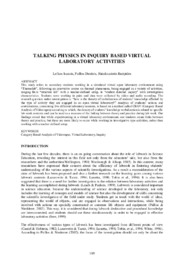Talking physics in inquiry based virtual laboratory activities

View/
Date
2010Author
Lefkos, Ioannis
Psillos, Dimitris
Hatzikraniotis, Euripides
Metadata
Show full item recordAbstract
This study refers to secondary students working in a simulated virtual open laboratory environment using “Thermolab”, following an innovative course on thermal phenomena, being engaged in a variety of activities, ranging from “structure lab” with a teacher-defined setup, to “student directed inquiry” with investigation characteristics. Students were working in pairs and data were collected by video and audio recording. The research question under investigation is: “how is the density of verbalization of students’ knowledge affected by the type of activity they are engaged in an open virtual laboratory?” Analysis of students’ actions and conversations, concerning five different laboratory sessions, is based on a method called CBAV (Category Based Analysis of Videotapes) according to which, the density of students’ knowledge verbalization is related to specific lab-work contexts and can be used as a measure of the linking between theory and practice during lab-work. Our findings reveal that while experimenting in a virtual laboratory environment, our students create links between theory and practice, but these are more likely to occur while working in investigative type activities, rather than working with a teacher-defined setup.